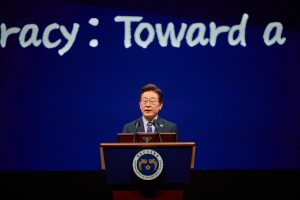According to the latest polls, South Korean President Lee Jae-myung’s approval rating reached 64 percent. Following his victory in the snap presidential election on June 3, which was scheduled due to the impeachment of Yoon Suk-yeol, Lee’s approval ratings have steadily increased.
With Lee’s strong support base among the general public, the ruling Democratic Party’s approval rating has also increased. Meanwhile public approval of the main opposition People Power Party (PPP), the former party of Yoon, has gradually decreased. The latest poll showed that 46 percent of the public support the DP while only 19 percent support the PPP.
Should the public keep supporting Lee and the DP at such a high rate, Lee’s party will likely win a landslide victory in the local elections next year, like it did in 2018. Thanks to then-President Moon Jae-in’s unprecedentedly high approval ratings, the DP won 14 seats of 17 metropolitan governor seats in the 2018 local elections. The PPP only secured two seats.
It’s fairly common for South Korean presidents to enjoy solid support from the public, reflected in positive approval ratings, during the early part of their single five-year term. However, Lee assumed office in unique circumstances, following Yoon’s shocking attempt to control the country through martial law. The public thus far has shown positive reactions to Lee’s attempts to restore the country’s democratic system.
The resurgent stock market following Lee’s victory in the election has also led moderates who did not even vote for Lee to support him. The new president also succeeded in projecting an image of himself as a passionate and hardworking leader, winning over skeptics. Even some conservative observers have admitted that there is nothing they can criticize about Lee’s statesmanship thus far.
As the DP also controls the power in the National Assembly, the party has moved quickly to investigate not only the martial law declaration but other allegations of corruption under Yoon. Three different probes led by special counsels have been launched to look into misdeeds during the Yoon administration, and some of the PPP senior lawmakers’ offices have been raided and searched. The PPP vehemently criticized these investigations while accusing the Lee government of politically suppressing it. However, the PPP’s appeal has not gotten much traction with the public, as evidenced by the latest polls.
The DP’s leadership has clearly implied that it does not have to work with those who did not participate in the National Assembly vote to lift Yoon’s martial law declaration on December 3. The majority of PPP lawmakers did not even head to the National Assembly to participate in the vote. Even after the DP lifted the martial law by itself, thanks to its majority in the National Assembly, the PPP impeded the DP and other parties’ effort to impeach Yoon.
In this context, some lawmakers in the DP and other liberal parties have already submitted a bill calling for disbanding the PPP over its role in cooperating with the “insurrection” led by Yoon’s martial law declaration.
































